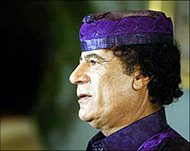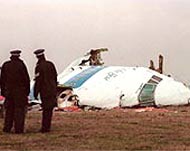Libya moves to prove nuclear plans
Libya is trying to shed its pariah status quickly, meeting UN nuclear inspectors after a surprise announcement it was abandoning efforts to build nuclear and other banned weapons.

As the United States and Britain promised rewards, Tripoli acted swiftly to prove its commitment to the world at large.
A top Libyan official met the head of the UN nuclear watchdog to discuss its proposals to eliminate weapons of mass destruction.
Almost 15 years to the day since his agents brought down a Pan Am airliner over Lockerbie, and eight months after US and British troops toppled Saddam Hussein on suspicion of developing banned weapons, Libyan leader Muammar al-Qadhafi has now opened the prospect of an end to sanctions and a return of US oil firms.
Britain said Libya had been close to making an atomic bomb, but information about Tripoli’s weapons capabilities was vague. The head of the International Atomic Energy Agency (IAEA), Muhammad ElBaradei, met a senior Libyan official on Saturday for a hastily-arranged meeting in Vienna.
“Dr ElBaradei met with Libya’s secretary of the National Board of Scientific Research to discuss the Libyan government’s desire to eliminate its weapons of mass destruction programme,” IAEA spokesman Mark Gwozdecky said.
Nuclear safeguards
Libya said on Friday it was ready to accept strict IAEA nuclear safeguards. Western diplomats said prior to the Libyan announcement, the IAEA had been growing increasingly concerned about signs Tripoli wanted to develop atomic arms.
 |
|
Al-Qadhafi has opened prospect |
Libya’s decision to voluntarily dismantle its atomic weapons programme is almost unprecedented – only post-apartheid South Africa has done so before – and Britain was swift to point out the contrast with Iraq, suggesting Saddam’s fate could have been different if he had cooperated.
Some US officials said it was too early to say when, or if, Washington would lift sanctions. Tripoli’s announcement on Friday was the culmination of secret talks with Britain and the United States, launched around the time of the Iraq invasion.
European critics of the invasion of Iraq remarked pointedly that it showed peaceful diplomacy could bring about disarmament.
“Libya wants to solve all problems and we want to focus on development and advancing our country. This (weapons) programme does not benefit our people or country,” Foreign Minister Muhammad Abd al-Rhman Shaljam told Aljazeera.
“We want to have ties with America and Britain because this
is in the interest of our people,” Shaljam said.
Praise for al-Qadhafi
Libya’s move came before Sunday’s anniversary of the 1988
bombing of Pan Am flight 103 over Scotland that killed 270
people. British relatives of the victims welcomed the news that dialogue had brought disarmament, Tripoli’s second dramatic step this year to rejoin the international community.
 |
|
Libya was blamed for the 1988 |
Libya was freed of broader UN sanctions this year after accepting responsibility for the Lockerbie bombing and paying billions to victims’ families. Washington left its sanctions in
place, accusing Tripoli of seeking biological and chemical arms.
British Foreign Secretary Jack Straw said al-Qadhafi’s decision was “statesmanlike and courageous”.
“If Saddam had come to us a year ago or more… then the situation in Iraq would have been a very different one,” he added.
France urged Libya to “implement without delay” compensation for families of victims of a 1989 bombing of a French airliner.
US President George Bush immediately praised Libya, saying: “Its good faith will be returned.” He said Tripoli’s progress would be monitored.
Lifting sanctions could allow US oil companies back into Libya, where they once produced more than one million barrels per day (bpd) and where oil facilities could reach two million bpd within five years, the US Energy Department said.